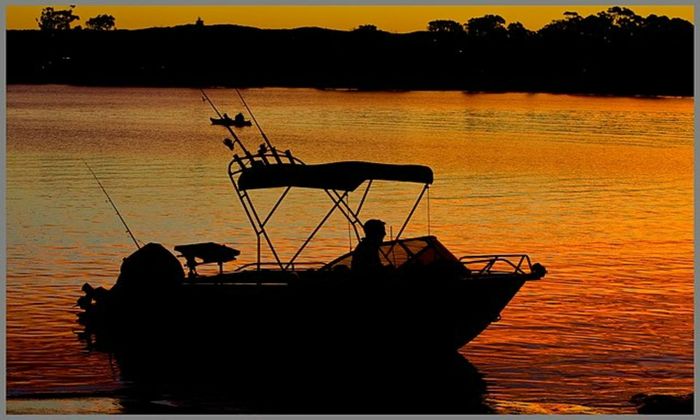10 Top Tips for Night Fishing
Night fishing is an excellent way to catch specific types of fish.

Night fishing is an excellent way to catch specific types of fish. Aside from being a fun hobby, night fishing can be a perfect way to get away from the daily routine and get some much-needed quiet time.
To be successful at night fishing, you need to learn a lot. Here are ten tips to help you become a better angler at night.
1. Understand the Moon Phases

Moon phases affect tides, and tides influence how fish behave in the water. A higher wave means fish are more active.

Fish are most active during the full moon because it causes them to come close to the surface. Most fish are nocturnal feeders, and the moonlight helps them see and feed at night.
The new moon has the least effect on fish behavior. Fish tend to stay deeper when there is no moonlight. During this phase, they tend to feed during the day. Consider using a spotlight instead of bright headlamps if you plan on fishing during the new moon. Spotlights have less glare than headlamps, which is less disruptive to the fish.
2. Prep Your Tackle Box
Before heading out for night fishing, the first thing to do is prepare your tackle box. A good tackle box has the following: hooks, lures, bobbers, leaders, sinkers, swivels, snap swivels, split rings, and clamps.
Don't forget to bring bug spray or insect repellent too. You may attract mosquitoes, gnats, or other insects that bite and sting you during this time, causing irritation.
3. Find the Perfect Spot Before Sunset
During the day, it is much easier to see everything, but at night it is entirely different. Finding a good spot before sunset is very important. You do not want to spend all night looking for a fishing spot to catch fish.
An excellent spot to start searching is near a dock or boat ramp. These areas usually have shallow water where fish like to hang out.

4. Start With Less Gear
It might sound like a good idea to bring all your fishing gear when night fishing, but it can be a hassle more than it is worth. Anglers of all skill levels should keep their gear simple in the beginning.
A rod and reel are all you need to get started. Bring a variety of lures, but avoid too bulky or big ones. You do not want your night fishing gear weighing you down.
Bring a few night lights as well. Do not forget to bring along any caffeinated drinks or energy supplements.
5. The Importance of Light
Lighting is one tactic that can help you catch more fish at night. Seeing everything can be challenging if you don’t have enough light. Any light source will work as long as it doesn't disturb the fish but is also bright enough to see at night. Fishing at night is more about stealth than flashiness.
Do not forget to bring extra batteries and power banks. Backups are always a good idea; you never know when your battery will die.
6. The Best Lures and Baits
There are different types of lures available. You need to know which one will work best for the fish you are trying to catch.
Fishing lures at night fishing can be pretty straightforward—a worm with a nightcrawler attached will do the trick. Try using a shiner or perch as bait for other species such as catfish.
7. Return to Your Favorite Spots
It is good to return to the same fishing spot that proved successful the previous night. Fish usually eat in the same area, and if they did it prior, they might do it again the following night.
As you gain experience, you'll improve your ability to read the water and become a great angler.
8. Be as Stealthy as Possible
One of the biggest mistakes you can make as a night fisher is being too loud. Noises from the boat are amplified into the shallow water. Keep your boat as quiet as possible by avoiding excessive equipment and noise.
Never shine a light directly on the water; this is another thing that will scare fish away. Hang your headlight, so it lights up the water from an angle while keeping yourself concealed.
9. Cast into Current Seams
Fish often follow the flow of water into and out of river channels, which is why they love currents. Cast your line where the currents converge to catch more fish. Make sure you don't get too close to the water's surface, or fish will see your lure coming from miles away.
Casting into current seams is an effective way to catch more fish, but it can be dangerous for both you and the fish. Many people who go night fishing underestimate the river’s power at night. It’s also important to remember that fish often take shelter in shallow water near banks and other areas, making it easy to get your lure tangled up or hooked on rocks or other objects.
10. Have Patience
Another common mistake that many anglers make when night fishing is expecting to catch fish right away.
Fishing at night requires patience and time, so you should always prepare for a long night of waiting and watching. You must remain as patient as you can to be successful.
It takes time to become a skilled angler. Without patience and practice, your skills will not improve. The same goes for night fishing. It takes time to master the art.
Takeaway
Night fishing is a fun activity that requires skill and practice. Anglers can make several mistakes while night fishing, but the most common is being impatient. It is important to wait for the fish to become curious about your lure rather than scaring it away with unnecessary noise or light.
To catch more fish, you have to remain stealthy. Don't make unnecessary noise that might scare them away. Keep your lights low and pointed away from shallow water to stay concealed.
Cast your line into the seam rather than the surface if you're fishing in current seams. Fish will come to your lure without you having to exert too much effort.
Practice and patience are vital if you want to improve your skills.




